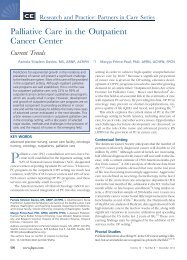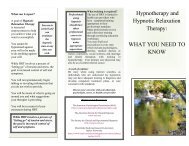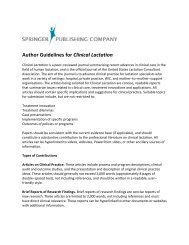Expertise in nursing practice : caring, clinical judgment - Springer ...
Expertise in nursing practice : caring, clinical judgment - Springer ...
Expertise in nursing practice : caring, clinical judgment - Springer ...
You also want an ePaper? Increase the reach of your titles
YUMPU automatically turns print PDFs into web optimized ePapers that Google loves.
xvi Introduction<br />
across time. However, the model does not focus or identify particular<br />
traits or talents of the person who generates the skillful performance.<br />
Nurs<strong>in</strong>g, as a <strong>practice</strong>, requires both techne and phronesis as described<br />
by Aristotle. Techne can be captured by procedural and scientific<br />
knowledge, knowledge that can be made formal, explicit, and certa<strong>in</strong><br />
except for the necessary tim<strong>in</strong>g and adjustments made for particular<br />
patients. Phronesis, <strong>in</strong> contrast to techne, is the k<strong>in</strong>d of practical reason<strong>in</strong>g<br />
engaged <strong>in</strong> by an excellent practitioner lodged <strong>in</strong> a community of<br />
practitioners who through experiential learn<strong>in</strong>g and for the sake of good<br />
<strong>practice</strong> cont<strong>in</strong>ually lives out and improves <strong>practice</strong> (Benner, Hooper-<br />
Kyriakidis, & Stannard, 2000; Dunne, 1997; Gadamer, 1975; MacIntyre,<br />
1981; Shulman, 1993). Techne, or the activity of produc<strong>in</strong>g outcomes,<br />
is governed by a means-ends rationality where the maker or producer<br />
governs the th<strong>in</strong>g produced or made by ga<strong>in</strong><strong>in</strong>g mastery over the means<br />
of produc<strong>in</strong>g the outcomes. By contrast, phronesis is lodged <strong>in</strong> a <strong>practice</strong><br />
and so cannot rely solely on a means-ends rationality, because one’s<br />
acts are governed by concern for do<strong>in</strong>g good <strong>in</strong> particular circumstances,<br />
where be<strong>in</strong>g <strong>in</strong> relationship and discern<strong>in</strong>g particular human issues must<br />
guide action.<br />
Technique and narrow rational-technicality alone cannot address <strong>in</strong>terpersonal<br />
and relational responsibilities, discernment, and situated possibilities<br />
required by car<strong>in</strong>g for persons made vulnerable by illness and<br />
<strong>in</strong>jury. Phronesis is required. Means and ends are <strong>in</strong>extricably related <strong>in</strong><br />
car<strong>in</strong>g for the ill. The cl<strong>in</strong>ician and patient bend and respond to the other<br />
so that the horizons and world are opened and reconstituted, allow<strong>in</strong>g<br />
new possibilities to emerge.<br />
As the Dreyfus model suggests, experiential learn<strong>in</strong>g requires the<br />
stance of an engaged learner, rather than a stance of one expert <strong>in</strong> techne<br />
who skillfully applies well-established knowledge <strong>in</strong> prespecified clear circumstances.<br />
Experiential learn<strong>in</strong>g requires openness and responsiveness<br />
by the learner to improve <strong>practice</strong> over time. The learner who develops an<br />
attuned, response-based <strong>practice</strong> learns to recognize whole situations <strong>in</strong><br />
terms of past concrete experiences, as po<strong>in</strong>ted out by the Dreyfus model.<br />
We found that respond<strong>in</strong>g to the situation as an “<strong>in</strong>stance of particular<br />
concerns” is central to the logic of excellent <strong>practice</strong>. As Bourdieu<br />
(1990) po<strong>in</strong>ts out, understand<strong>in</strong>g the nature of the situation is at the<br />
heart of practical reason<strong>in</strong>g, and cl<strong>in</strong>ical reason<strong>in</strong>g is a form of practical<br />
reason<strong>in</strong>g. Cl<strong>in</strong>ical reason<strong>in</strong>g is always reason<strong>in</strong>g across time about<br />
the particular through transitions <strong>in</strong> the patient’s condition or concerns<br />
and/or changes <strong>in</strong> the patient’s condition. For example, a cl<strong>in</strong>ician might

















